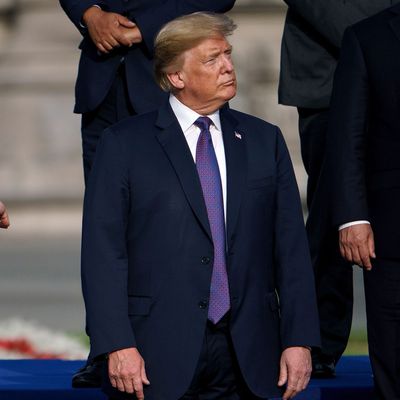
Too much coverage in the run-up to this week’s NATO Summit treated the conflict between President Trump and European leaders like a four-alarm fire – as if maybe it could be put out. Or at least tamped down to a smolder, so that maybe Moscow wouldn’t notice.
But fire is the wrong plague metaphor here. Think earthquakes — one after another after another, jolting the landscape of international relations and leaving behind ever-greater chaos. The list of recent temblers includes Trump’s assaults on the alliance, his ongoing efforts to harm or humiliate Germany’s Angela Merkel, Canada’s Justin Trudeau, and others. But there are also the shocks from other member states over recent months — Turkey flouting democratic and alliance norms, Poland and Hungary edging away from the rule of law, Italy joining Trump in undercutting alliance positions on Russia’s aggression in Crimea and elsewhere. Trump used this week’s summit to administer additional stress tests, of course, from a personalized assault against Merkel at the opening breakfast to late-day tweets demanding, out of nowhere, that alliance members double the proportion of their GDP they pledge to spend on defense.
After all these earthquakes, what’s left of the largest, most prosperous, most democratic alliance in human history? Well, NATO was still able to put out a unanimous communique calling on Russia to demonstrate “compliance with international law and its international obligations and responsibilities.” And it started a training program for post-ISIS Iraq. So, no, Trump didn’t destroy the Atlantic Alliance at the summit. He is not going to come home and attempt to withdraw from the treaty that commits the U.S. to the defense of its European allies, and vice versa. With all due respect to pre-trip headlines, that was never the plan.
Let’s look at the pattern here: Trump announced that the U.S. was withdrawing from the Paris climate accord — but that doesn’t take effect until 2020. He said he would pull out of NAFTA — and we’re still waiting on that one. He described the Group of Seven major industrial powers as useless without Russia — and yet he is still happy to show up at the summit and throw Starbursts at Merkel. He threatened to quit the World Trade Organization — but really he’s just complaining other countries don’t live by its rules.
The two pacts he has bothered to walk away from are the Trans-Pacific Partnership trade deal and the seven-party “Iran deal” formerly blocking Tehran’s progress toward a nuclear weapon. What did those two agreements have in common? They were brand-spanking-new Obama projects, not ensconced in years of policy-making tradition. His base was already against them, and both deals could be voided without doing much of anything, or asking congressional Republicans to do much of anything.
Trump is not going to do his opponents within the GOP the favor of giving them an issue on which they have a fighting chance to prevail. Although an enormous partisan gap on NATO has emerged, almost half of Republicans still view the alliance favorably — and the majority of its critics on the right favor it doing more, rather than it going away.
So does that mean that today’s crass and unpleasant performance from Trump is just more theater, and the NATO fans on both sides of the Atlantic who argue that the alliance can endure with good staff work, congressional statements, and Defense Secretary James Mattis are right?
Nope.
The emergency is real, all right. The ground is indeed shuddering beneath our feet. It’s not about whether NATO summits come off well though, as it is about the steady degradation of the principle that U.S. international relations have long been built around. I’m referring here to mutual commitments and shared interests and values — above all, the rule of law — that transcend the challenges of the moment. Trump seeks to destabilize not just the NATO we have right now — already deeply challenged by Russia and by illiberalism across Europe — but the very idea that anything bigger or more lasting than his own interests defines American interests.
Our European allies may keep coming to the summits, politely tolerating his abuse, and even upping their defense spending — but they are getting the message. So are leaders in Moscow, Beijing, and elsewhere. Much more than about NATO, it’s a message that the leader’s personal pique means a great deal — and years or even decades of commitments and partnership may mean very little. That monumental shift in how the U.S. is expected to conduct itself cannot be “cleaned up” — not by Cabinet “adults” or staff, not by a good meeting in London or Helsinki, and definitely not by tweets.





























